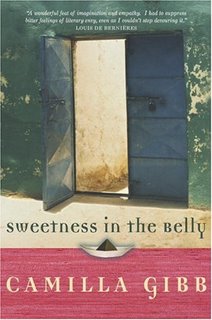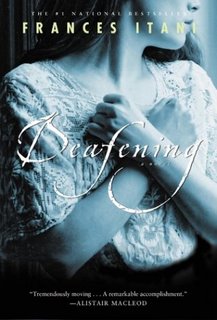Sweetness in the Belly, by Camilla Gibb
 I'm not sure how to describe Sweetness in the Belly, except to say that you really have to read it. It was a book club selection at one of my favourite online hangouts, chicklit.com , and I was disappointed that I didn't get it from the library in time to have it read before author Camilla Gibb came online for a chat with readers. The library finally came through for me, and Sweetness in the Belly was well worth the wait.
I'm not sure how to describe Sweetness in the Belly, except to say that you really have to read it. It was a book club selection at one of my favourite online hangouts, chicklit.com , and I was disappointed that I didn't get it from the library in time to have it read before author Camilla Gibb came online for a chat with readers. The library finally came through for me, and Sweetness in the Belly was well worth the wait.This novel explores several interesting and little-known cultural niches through the eyes of a heroine who is a perpetual outsider: Lilly never really fits neatly anywhere. She's the child of wandering English hippies who leave her at a Muslim shrine in Morocco and then fecklessly get themselves killed, leaving her to grow up at the shrine. So this little white girl is raised by Sufi mystics in Morocco, then finds her way to Ethiopia and eventually to England, where she lives as an adult among Muslim refugees -- her own people, despite her white skin and English pedigree.
Camilla Gibb gives the Western reader a glimpse into a multifaceted Islamic world that is much more complex and nuanced than the oversimplified vision of Islam we often have in the West. We also get glimpses into Ethiopian history and politics that will probably be new and revelaing to many readers, as they were to me. But this is not a dry presentation of the author's research; rather, it's a compelling story told through the eyes of a woman we really care about. Lilly is a difficult, prickly, suspicious character who has been badly hurt and has had trouble moving on from her losses, but I found myself cheering for her (and the attractive Dr. Gupta!) every step of the way. Other characters -- including the two men Lilly loves, and the large cast of friends and acquaintances she meets along her journey -- are drawn just as deftly; even characters with bit parts are memorable and sometimes heartbreaking. I highly recommend this novel!










